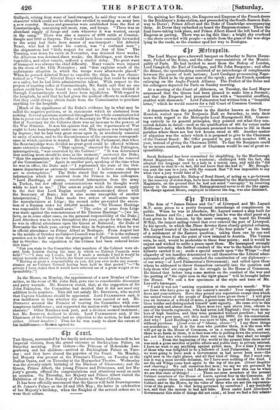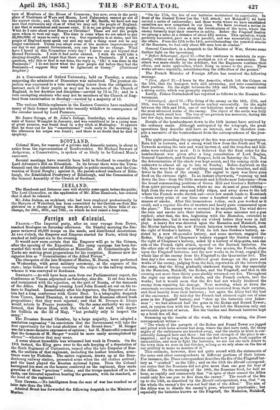t4t Vrouturro.
The firm of "James Baines and Co." of Liverpool and Mr. Layard M.P. seem given to a pretty frequent interchange of compliments in public. When he was at Aberdeen' Mr. Layard named a ship built for James Baines and Co. ; and on Saturday last he was the chief guest at a feast given in his honour, by the same company, on board the Donald M`Kay, the largest sailing-vessel that ever entered the port of LiverpooL In his speech, to which the Xrenes devotes three closely-printed column5 Mr. Layard treated of the inadequacy of "the four points" as the hams of a settlement of the Eastern question ; taking them one by one and criticizing them from the point of view inimical to Austria. The 'Vienna note, he said, would be preferable to these four points ; and it would be unjust and wicked to settle a peace upon them. He harangued strongly against intrusting the further conduct of the war to the hands that have hitherto carried it on ; made a special assault upon "the Whigs "—that oligarchy of ten families determined to call themselves the Liberal admi- nistrators of public affairs; attacked the constitution of our diplomacy— of our army—of Lord Palmerston's Government; and called upon those whom he addressed to throw themselves earnestly into the question and help thorie who' are engaged in the struggle in the House of Commons. He hinted that before long some motion on the conduct of the war and the putting of "the right men in the right places" will be brought before the House. We cull a few specimens, of the style and tone of Mr. Leyard's harangue. " I said it was not ' seeking reputation at the cannon's mouth.' Who are those who have gone up to the cannon's mouth ? - Your regimental of- ficers and your soldiers. Have they gained any reputation except that which the united voices of the people of England have given them ? I will give you an instance of a friend of mine, a gentleman who served throughout all those battles and distinguished himself most signally. He came over to this country sick and almost dead. There were two men above him, officers in one of the Guards regiments, who heti never left England ; they were mem- bers of high families, and they were promoted without purchase ; but my friend was a poor man and they made him pay 3000/. for his commission. And why ? Lord Hardinge's son was next to him, and got his commission without purchase. (Loud cries of "Shame, 8/lame!") I say these things are scandalous; and it is the man who justifies • them, it is the man who will get up in the House of Commons, or in a meetin,g like this, and say there is no harm in them, kis that man who is pulling down the aristocracy, and not that man who condemns them and says that they shall no longer be From the beginning of the world to the preseut time there never was such a gross sacrifice of public affairs and public duty to private interest. I have no wish to say anything against public men. Por a time I was one of those who was delighted to be a follower of Lord Palmerston. I believed we were going to have such a Government as had never been seen—the right men in the right places, and all that kind of thing. But I must con- fess it was a most terrible delusion, for I have seen nothing of the kind. I see the old Whigs come back again to the top of the pot. (Great laughter and cheering.) We call ourselves free men ; we say we are governed by our own representatives ; but I should like to know how this can be when we see this state of things ? . . . . There are nine members of the present Cabinet members of the House of Lords, against four in the Commons. Of course, under these circumstances, every question is decided, both in the Cabinet and in the House, by the voice of those who are not the representa- tives of the people. Is that being governed by ourselves? I say decidedly not, and that the system is bad arid false. Even under Lord Aberdeen's Government this state of things did not exist ; at least we had a fair admix- tore of Members of the House of Commons ; but now, even in the petty place of 'Chairman of Ways and Means, Lord Palmerston cannot go out of the narrow circle ; and, with the exception of Mr. Smith, we have not one man that represents any class of what we may call the people of England. I say that is scandalous and cannot exist. It is no use gang to petty people. What do I care about your Boxers or Christies ? These are not the people upon whom to vent our rage. The time is come when we are asked to pay 30,000,0001. of taxes to carry on a war. Our reputation is at stake, and the people of England must speak out and say such a thing must not be any longer continued. Unless you adapt some of the modern improvements of our day to our present Government, you can hope for no change. What have I heard in this Committee every day ? I never can get beyond that blessed Peninsula. I wish it had never existed. I wish vie could take a sleeping-draught, and forget that there ever was a Peninsula. If I ask a question, why this or that is not done, the reply is, Ohl it was done in the Peninsula I do not know what the poor people did before they had the Peninsula—I suppose they went to Agincourt or Cressy." (Continued laughter.) At a Convocation of Oxford University, held on Tuesday, a statute respecting the admission of Dissenters was submitted. The greatest ob- jection was expressed to a vote exempting tutors from the obligation to instruct such of their pupils as may not be members of the Church of England, in her doctrine and discipline—carried by 75 to 72; and to a vote exempting students who may not be members of the Church of Eog- land from examination in theology—carried by a majority of 12.
The various Militia regiments in the Eastern Counties have readmitted many of their former members who recently withdrew in consequence of the circular issued by Lord Panmure.
Mr. James Savage, of St. John's College, Cambridge, who attained the rank of Senior Wrangler in January, and was considered to be a young man of great promise, was found dead in a dry ditch at Madingley. It appears that he went out for his "constitutional" walk early in the morning ; in the afternoon his corpse was found ; and there is no doubt that he died of apoplexy.



























 Previous page
Previous page